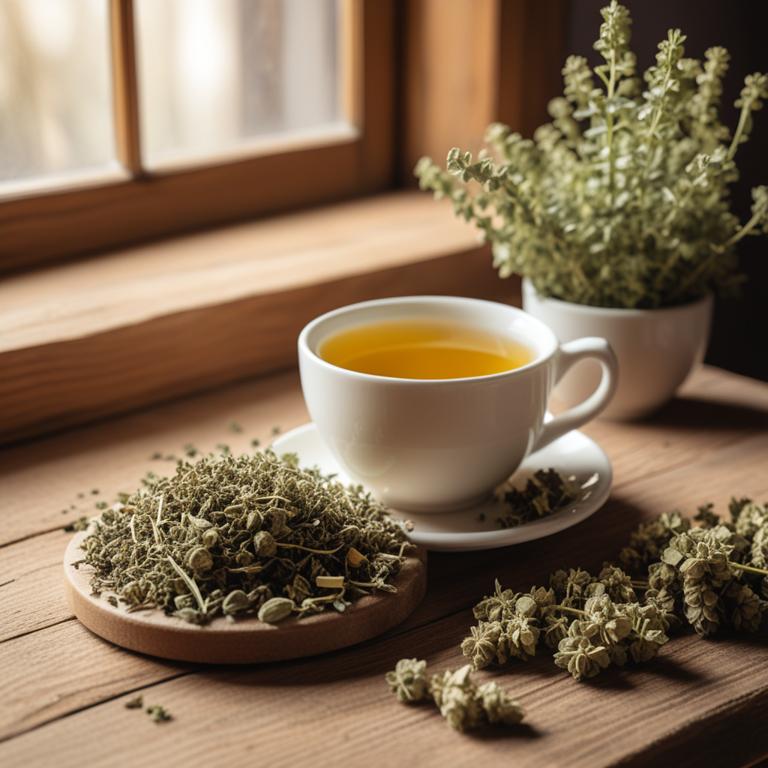9 Best Herbal Teas For Bleeding Gums

Herbal teas for Bleeding gums are a natural remedy that helps to soothe and treat gum inflammation, characterized by bleeding gums due to gum disease or other oral health issues.
The benefits of using herbal teas to treat bleeding gums include reducing inflammation, fighting infection, and promoting healing.
Various herbal teas, such as peppermint tea, which has antibacterial properties, can help to combat gum infections, while sage tea, rich in antioxidants, can reduce inflammation and promote gum healing.
Other herbal teas used to treat bleeding gums include chamomile tea, which calms the mouth and reduces bleeding, and eucalyptus tea, which has anti-inflammatory properties that help to reduce swelling and pain in the gums.
According to "Iranian journal of basic medical sciences", teas for bleeding gums such as green tea may be effective in reducing gingival inflammation and bleeding, which can help alleviate symptoms of bleeding gums.
Below there's a list of the 9 best herbal teas for bleeding gums.
- 1. Salvia officinalis teas
- 2. Achillea millefolium teas
- 3. Thymus vulgaris teas
- 4. Mentha x piperita teas
- 5. Cinchona officinalis teas
- 6. Echinacea purpurea teas
- 7. Melissa officinalis teas
- 8. Origanum vulgare teas
- 9. Lavandula angustifolia teas
Also you may be interested in...
TODAY'S FREE BOUNDLE
Herb Drying Checklist + Herbal Tea Shopping List + Medicinal Herbs Flashcards
Enter you best email address below to receive this bundle (3 product valued $19.95) for FREE + exclusive access to The Aphotecary Letter.
$19.95 -> $0.00
1. Salvia officinalis teas

Salvia officinalis teas, derived from the leaves of the sage plant, have been traditionally used to treat bleeding gums due to their anti-inflammatory and antimicrobial properties.
The bioactive constituents, such as rosmarinic acid, ursolic acid, and carnosic acid, help to reduce inflammation and fight off bacterial infections that can cause bleeding gums.
By promoting healthy gum tissue and reducing inflammation, Salvia officinalis teas can help to alleviate bleeding gums and prevent further complications.
The benefits of using these teas to treat bleeding gums include improved gum health, reduced pain and discomfort, and a lower risk of developing more severe oral health issues.
Related Study
According to "Journal of cancer research and clinical oncology", Salvia officinalis teas may be beneficial for alleviating symptoms of bleeding gums, particularly when used to treat oral mucositis and gingivitis.
2. Achillea millefolium teas

Achillea millefolium teas, also known as yarrow tea, have been traditionally used to treat bleeding gums ailment due to its anti-inflammatory and astringent properties.
The herbal preparation helps to treat this ailment by reducing inflammation and promoting clotting of blood, thereby reducing bleeding.
The bioactive constituents of yarrow tea, including sesquiterpene lactones and flavonoids, contribute to its therapeutic effects by inhibiting platelet aggregation and improving blood clotting.
Regular consumption of Achillea millefolium teas may help to alleviate bleeding gums by reducing inflammation and promoting tissue repair, making it a beneficial herbal remedy for this condition.
Related Study
According to "Journal of medicinal food", Achillea millefolium teas for bleeding gums contain anti-inflammatory properties that promote cellular proliferation, contributing to faster tissue regeneration and potentially aiding in the healing of bleeding gums.
3. Thymus vulgaris teas

Thymus vulgaris teas, also known as thyme tea, have been traditionally used to treat bleeding gums due to its antiseptic, anti-inflammatory, and astringent properties.
The bioactive constituents, including thymol and carvacrol, help to reduce inflammation and prevent bacterial growth, thereby promoting healthy gum tissue and reducing bleeding.
Thymus vulgaris teas work by reducing inflammation, killing bacteria, and promoting the healing of gum tissue, ultimately leading to a reduction in bleeding and an improvement in overall oral health.
The benefits of using Thymus vulgaris teas to treat bleeding gums include a reduction in pain and inflammation, promotion of healthy gum tissue, and a decrease in the risk of further complications, making it a popular natural remedy for this common condition.
Related Study
According to "Nutrients", Thymus vulgaris teas for bleeding gums may be beneficial due to the presence of flavan-3-ols and proanthocyanidins, which have immunomodulatory effects and may inhibit bacterial proliferation and proinflammatory signaling, thus alleviating the cause and symptoms of periodontal disease.
4. Mentha x piperita teas

Mentha x piperita teas, also known as peppermint tea, have been traditionally used to treat bleeding gums due to their anti-inflammatory and antiseptic properties.
The herbal preparation helps to treat this ailment by reducing inflammation and promoting healing in the gums, thereby stopping the bleeding.
The bioactive constituents of peppermint tea, such as menthol and menthone, have antimicrobial properties that help to combat the underlying infections that cause bleeding gums.
Regular consumption of Mentha x piperita teas can help to alleviate bleeding gums, promote oral health, and prevent further complications.
Related Study
According to "Avicenna journal of phytomedicine", Mentha x piperita teas may be beneficial for bleeding gums due to the significant effects of its essential oils on inhibition of oral bacteria biofilm formation.
5. Cinchona officinalis teas

Cinchona officinalis teas, derived from the Cinchona tree, have been traditionally used to treat bleeding gums and other gum-related disorders due to their anti-inflammatory and antimicrobial properties.
The quinine and other bioactive constituents present in these teas, such as alkaloids and flavonoids, help to reduce inflammation and prevent bacterial growth in the gums, promoting healthy gum tissue and preventing bleeding.
The antiseptic properties of Cinchona officinalis teas also aid in the prevention of infection and promote the healing of wounds in the gums, ultimately leading to improved oral health.
Regular consumption of Cinchona officinalis teas has been shown to be beneficial in treating bleeding gums, as it helps to strengthen the gums and prevent further damage.
6. Echinacea purpurea teas

Echinacea purpurea teas have been traditionally used to treat bleeding gums, a common oral health issue characterized by inflammation and bleeding of the gums.
The anti-inflammatory and antimicrobial properties of this herbal preparation help to reduce inflammation and prevent infection, promoting healing and preventing further bleeding.
The bioactive constituents of Echinacea purpurea teas, including alkylamides, caffeic acid derivatives, and phenolic acids, have been shown to exhibit antioxidant and anti-inflammatory activities that help to treat bleeding gums.
The benefits of using Echinacea purpurea teas to treat bleeding gums include reduced inflammation, prevention of infection, and promotion of gum healing, making it a popular natural remedy for this oral health issue.
7. Melissa officinalis teas

Melissa officinalis teas have been traditionally used to treat bleeding gums, a common oral health issue characterized by inflammation and bleeding of the gums.
The anti-inflammatory and antimicrobial properties of this herbal preparation help to reduce inflammation and combat bacterial infections that contribute to bleeding gums.
The bioactive constituents of Melissa officinalis, including flavonoids, terpenes, and phenolic acids, have been shown to exhibit potent antioxidant and anti-inflammatory activities, which aid in the treatment of bleeding gums.
By consuming Melissa officinalis teas, individuals can experience the benefits of reduced inflammation, improved gum health, and a lower risk of oral infections.
Related Study
According to "Nutrients", Melissa officinalis teas for bleeding gums may have potential benefits due to the presence of flavan-3-ols and proanthocyanidins, which have been shown to have immunomodulatory effects and inhibit bacterial proliferation and proinflammatory signaling.
8. Origanum vulgare teas

Origanum vulgare teas, also known as wild marjoram or oregano tea, have been traditionally used to treat bleeding gums due to their antimicrobial, anti-inflammatory, and antioxidant properties.
The bioactive constituents of Origanum vulgare, including carvacrol and rosmarinic acid, help to reduce inflammation and prevent the growth of bacteria that can cause gum disease.
By reducing inflammation and bacterial growth, Origanum vulgare teas can help to promote healing and prevent further bleeding, making them a potential natural remedy for bleeding gums.
The benefits of using Origanum vulgare teas to treat bleeding gums include reduced inflammation, improved oral health, and a decreased risk of complications such as tooth loss.
Related Study
According to "Frontiers in microbiology", Origanum vulgare teas for bleeding gums may be beneficial due to its ethanolic extract's broad-spectrum antimicrobial and anti-biofilm properties, which can help prevent biofilm formation and reduce the adherence of dental plaque isolates to teeth surfaces.
9. Lavandula angustifolia teas

Lavandula angustifolia teas have been traditionally used to treat bleeding gums, a condition often caused by gum inflammation and bacterial infections.
The antiseptic, anti-inflammatory, and antimicrobial properties of this herbal preparation help to reduce gum inflammation, prevent infections, and promote healing.
The bioactive constituents of Lavandula angustifolia, including linalool and linalyl acetate, have been found to exhibit antimicrobial activity, which helps to combat bacterial infections that cause bleeding gums.
Regular consumption of Lavandula angustifolia teas has been shown to be beneficial in treating bleeding gums by reducing inflammation, preventing infections, and promoting oral health.